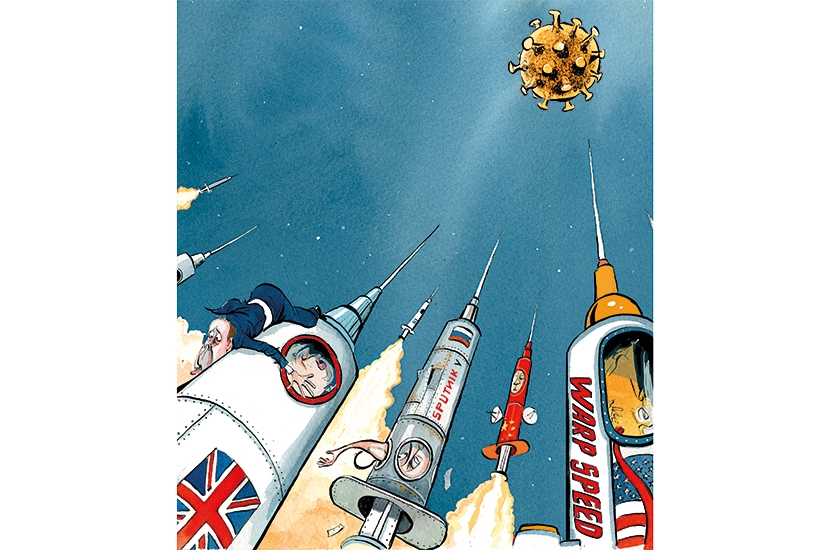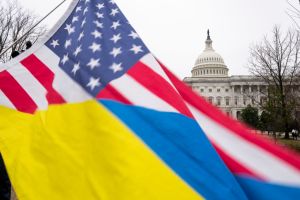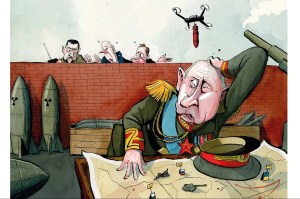It could be the most audacious piece of political theater of modern times. At the end of next month, just a week or so before Americans choose their next president, we could see Donald Trump standing on the White House lawn in front of a handful of friendly journalists, rolling up his sleeve and looking solemnly into the camera with hardly a wince as a nurse expertly administers America’s newly licensed coronavirus vaccine. ‘We did it,’ he will announce, adding that the biggest mass vaccination program in history is ready to roll out. ‘An American vaccine that has made America great again.’
Far-fetched? Ridiculous? Perhaps not. Even though trials of Britain’s Oxford vaccine were paused this week, others remain on track. Trump dropped the broadest possible hint about his thinking when he said on Monday: ‘We’ll have the vaccine soon, maybe before a special date. You know what date I’m talking about.’ If he rushes through a shot for Election Day he will be far from alone in twisting immunology in pursuit of ideology. Vladimir Putin has already been given Russia’s vaccine (called Sputnik V) and has even tried it out on one of his daughters. The Chinese this week prominently displayed their two lead vaccines at the Beijing trade fair. Meanwhile, the British may have stumbled, but the French and the Germans are scrambling to get their shots to the front of the line. The race for a vaccine to combat COVID-19 may have started as serious scientific endeavor, but it has begun to mutate — a little like viruses themselves sometimes do — into something else: a deadly game of geopolitics, pitting nation against nation. Like a medical version of the Space Race, it has become a battle of prestige, to see which country is the cleverest and which nation can have the rest of the world taking its jabs.
Vaccines have never been quick or easy to create and COVID-19, as a variant of the common cold, was always likely to be especially difficult. As the pandemic started to spread around the world, however, something else happened. With societies in lockdown and economies crashing at the fastest rate in history, world leaders started to panic. They wanted a vaccine and they wanted it now. And they were no longer too squeamish about cutting a few corners to get it.
The World Heath Organization has been trying to corral countries into its Covax program to co-operate with one another. So far it has mostly been in vain. Sure, Norway and Canada might co-operate, but the great powers, and even the medium-sized ones, are no longer interested. They want this to be about winning. Even the names of the potential vaccines, loaded with Space Race symbolism from the height of the Cold War, reveal the intentions of the countries developing them.
The American program is named Operation Warp Speed, a Star Trek reference that will hardly be lost on anyone (if the vaccine itself is called Apollo, no one should be in the least surprised). Russia’s Sputnik is named for the satellite that stunned the world in 1957, revered even now as a pinnacle of Soviet scientific achievement. The vaccine solicited an immune response in all 76 of the people it was tested on, but Moscow’s self-declared victory seems a bit early when no scientific data has yet been published. Sputnik is now being given to 40,000 people, with the first results expected next month. This means that the Kremlin’s vaccine is technically the first to be formally approved, even if it hasn’t yet been shown to work. But we do have Putin’s word for it: he announced to his cabinet that Sputnik ‘works quite effectively, helps to develop strong immunity, and has gone through all the necessary tests’. His daughter, he added, ‘feels well’.
Skeptics might laugh, but Sputnik V is now regarded as one of the most advanced of the 34 vaccines in clinical development, neck-and-neck with the British candidate. Both work in the same way: using adenoviruses (the family that causes the common cold) which have been altered so they can’t replicate, and so their DNA encodes the spike protein of SARS-CoV-2. This provokes an immune response that should be able to fight off the coronavirus.
The British jab, known as AZD1222, is being developed by AstraZeneca and the University of Oxford. Whether it can recover from the adverse reactions discovered this week remains to be seen. Before that, ‘the Oxford vaccine’, as patriotic a name as you could wish for, had already turned into a symbol of national pride. The ever-optimistic Matt Hancock had declared that it would most likely be ready in the ‘first few months of next year’. Maybe the UK health secretary will switch to backing the Cambridge shot?
Meanwhile, China’s two leading candidates have adopted what is known as ‘inactivated vaccine technology’, a traditional technique used for diseases such as flu and measles. The science is not as cutting edge as the American or European projects, but China’s strength may turn out to be its ability to mobilize the vast resources at its disposal — including tens of thousands of ‘willing volunteers’ from the People’s Liberation Army — to get the work done at blitzkrieg pace. Sometimes speed matters as much as science, and this may be an example of that.
A few scenarios reveal in an instant just how much this race matters. Let’s imagine that China comes up with the first effective vaccine. Can anyone imagine Trump getting on the phone to haggle with President Xi Jinping for 300 million doses? Could he bring himself to admit that his own Warp Speed shot will miss its January deadline? If Russia’s Sputnik proves successful — and a review in the Lancet this week was positive — can we see the US, the EU, and indeed China going cap in hand to the Kremlin asking for full access? Or will Britain decide that it’s worth waiting a few weeks to see how the chaps at Oxford get on?
Yes, Putin wants the kudos. But who doesn’t? In Britain, which has had one of the most shambolic responses to COVID-19 in the developed world, the Oxford vaccine offers a chance of instant redemption. Boris Johnson and Hancock would proclaim that British ingenuity was again saving the world (whenever the UK seems especially hopeless, a story that the vaccine is almost ready miraculously appears in the papers). A French vaccine would ensure Emmanuel Macron’s re-election in an instant, while Angela Merkel would no doubt earnestly donate a German vaccine to the WHO while quietly making sure the country’s chemicals giants stitched up the global market for key ingredients.
Of course, Russia and China also have a head start on industrial espionage: the dark art of hacking into big western companies and stealing their intellectual property. So it was no surprise to learn that the Oxford vaccine suffered such a hack recently. There have already been stories of Chinese spies tracking down the Moderna and Pfizer shots, and of the Americans trying to buy up the leading German biotech labs. Much more skulduggery will be taking place in the shadows. Intelligence agencies have always done the dirty work for great power contests: stealing medical data from labs should be right up their street.
Whether anyone makes any real money from a vaccine is open to question. AstraZeneca has already said that if the Oxford vaccine works, it will be released at ‘cost price’, or about £2.25 ($2.90) a shot. Xi has said China’s vaccine would be ‘a global public good’. It is unlikely any country or company would try to make vast profits from the vaccine itself. The risk of a backlash would be too great. The real payoff will be elsewhere. For both the leader and the country, inventing the first vaccine will confer both moral and political authority: after all, saving the world is no small matter. In the democracies, both reelection and a legacy will be secured in an instant. Trump will be transformed from a chaotic, blustering bully into a statesman and global leader. The same will be true for Johnson. For the autocracies — and Russia and China are both in that category — it is even more important. China will no longer be a place that makes cheap stuff.
Of course, we shouldn’t be too sniffy about vaccine nationalism. There may be a lot of childish, patriotic chest-beating and the motives might be far from pure, but surely the more competition, the better? Because that’s what normally gets results. In the Space Race, men did end up walking on the moon, and the development of the science to get them there started a wave of technology that is still transforming the world. Innovation doesn’t happen in a vacuum. It requires resources, determination and a goal.
If the vaccine race ends up making Trump or Putin or Xi look better on the world stage, would that be so bad? We will still all benefit from the vaccine. And if they are difficult about its distribution, it probably won’t make much difference. (Although it seems some of the vaccines need to be stored at -112°F, raising questions about whether the world has enough freezers.)
In the Cold War, the West couldn’t even keep the technology for making nuclear weapons secret. It is unlikely anyone could keep the formula for a vaccine manufactured in hundreds of millions of doses confidential for long. Competition gets results, and national competition is no different from any other sort.
[special_offer]
Too much nationalistic bluster might well undermine public confidence, though. If you are expected to shoot something into your bloodstream, most of us would prefer to have scientists rather than politicians deciding whether it is safe or not. In Russia and China, people may not have much choice, although a Russian teachers’ union is already saying that no one should be forced to have the jab. In the West, it will be different. Lots of people will have doubts about taking a ‘Donald’ or indeed a ‘Boris’ vaccine.
All these attempts, like the Oxford one, might flounder. After all, the average vaccine takes about 10 years to develop and approve. There’s an obvious desire right now to forget this and believe in the imminent arrival of a medical cavalry. Even the scientists get a bit ahead of themselves: Oxford’s early declaration that there was an 80 percent chance of a successful jab, and that it could be ready by the end of this month, is looking hubristic right now. But if the race for the vaccine is won by any country, it may determine the global balance of power for the next decade and potentially even longer.
A vaccine for COVID-19 could have been a global scientific project. But it has descended into a 21st-century version of the Great Game, a contest for power and influence between nations. And that game has only just begun.
This article was originally published in The Spectator’s UK magazine. Subscribe to the US edition here.


















